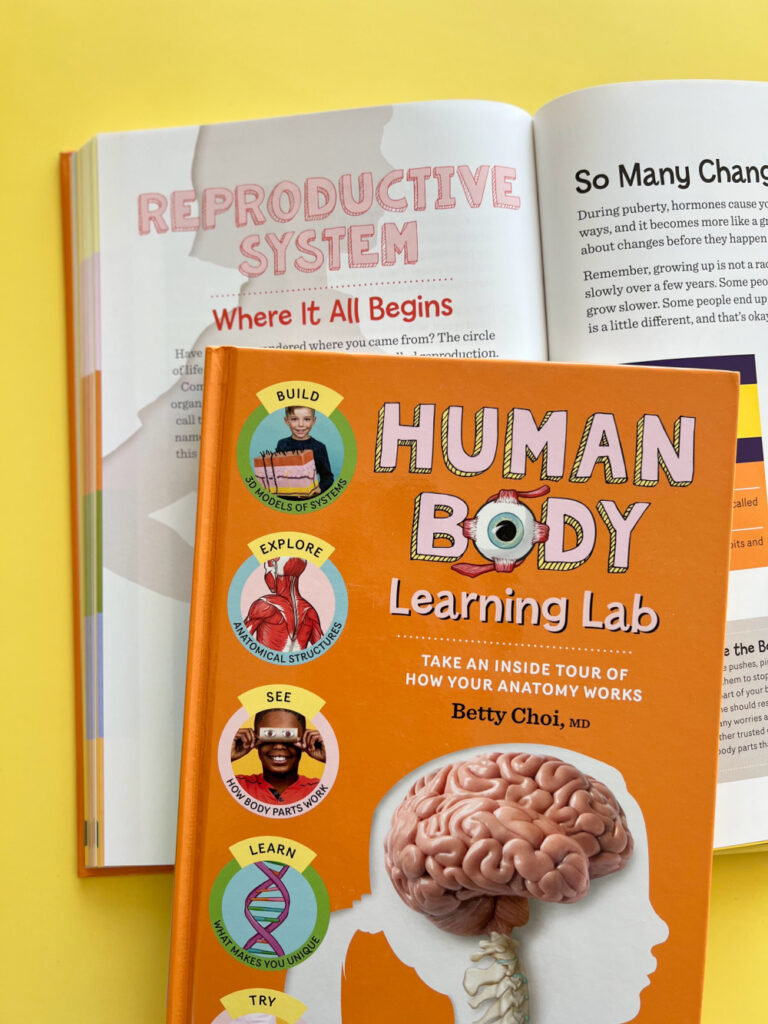Safety First: Why Kids Need to Learn Real Names for Private Parts

Growing up, real names for private parts and sex education were avoided like the plague in my home. However, in medical school, I learned that real names for private parts should be introduced honestly and matter-of-factly, even with young children.
Like it or not, kids need to know about their private parts. The good news is that parents don’t have to teach it perfectly all at once. That’s because the learning process is gradual throughout life.
The wrong way to teach kids about private parts
Although my immigrant parents could speak multiple languages, there were no words for anything “down there.”
When I was seven years old, I flipped through an encyclopedia featuring a full-spread illustration of intercourse. Full of innocent curiosity, I brought the book to my parents with questions and revelations. “Mommy! Daddy! I figured out where babies come from! Mommies have eggs, and daddies have sperm!”
Shocked about the photo in our new science book, my parents panicked, cut out the offending page, and blurted, “Actually, babies come from Santa Claus!” Since I knew that Santa Claus was not real, I felt confused and ashamed about my questions. Unfortunately, it was one of many discussions that created a barrier to trust in our relationship.
Eventually, I heard about the “birds and the bees” from friends. I learned about the function of “private parts” at a grade-wide lecture in 5th grade. Giggles and snickers were shushed by teachers, and the topic was filled with embarrassment.
Recommended: The Best Human Anatomy Toys | Fun Science Gifts for Kids
Penis, scrotum, vulva, vagina: why children need to know real genital names instead of nicknames
We instinctively teach our children the names of their heads, shoulders, knees, and toes. If our kids trip and fall, they can tell us which part hurts.
On the other hand, when real names for private parts are avoided, children won’t know how to describe normal actions as well as important problems. Nicknames and slang terms for genitalia create confusion and shame.
According to the American Academy of Pediatrics:
In early childhood, parents can teach their children the name of the genitals, just as they teach their child names of other body parts. This teaches that the genitals, while private, are not so private that you can’t talk about them.
Recommended: Emotions Book and Montessori 3-part cards
Experts warn about the reality of sexual abuse
Most cases of sexual abuse are caused by someone the child or family knows. Abuse can be difficult to discover when the perpetrator is a manipulative person whom the family trusts.
Developmental psychologist Dr. Dona Matthews points out:
“When children feel awkward talking about certain body parts—if they giggle when someone mentions those parts, for example—they’re more likely to feel embarrassed about asking questions, and they’re less likely to tell you if someone is touching them inappropriately.
While abuse is always the perpetrator’s fault, empowering a child with knowledge can protect them. Connection and communication can potentially prevent and end grooming, harassment, bullying, and assault.
Communication is key: how to normalize real names for private parts
The first step to empowering our children is to talk with real names for private parts during regular conversation. Pediatrician Dr. Perri Klass advises:
“Ideally, parents should start teaching those terms even before their children can talk, naming the genitals just as they name other body parts in the inevitable daily round of small-child body care and grooming and, yes, diapering and potty time.”
Practice saying real names for private parts
In my experience as a pediatrician, I’ve met many parents who did not know the names of their own genitalia or that of the opposite sex. This is common across cultures and education levels.
Since most female genitalia are not visible, many men and women are confused about the vulva and the vagina. In my own family, an older relative only knew the slang term “小鸡 / 小雞 (little chicken)” instead of the real name, “阴茎 / 陰莖 (penis)”.
To overcome awkward or embarrassing feelings, practice saying the names out loud a few times each day in the mirror before talking to your child.
Read children’s books with real names of private parts

If you don’t know how to start, read kid-friendly human body books with labeled anatomy pictures. When private parts are nonchalantly discussed with the head, shoulders, knees, and toes, kids learn that all body parts are equally important.
If you or someone you know is pregnant, children’s books about pregnancy and new siblings can help normalize these conversations.
Remember, if you’re feeling awkward, working through the discomfort is worth the struggle. You can read the books alone before reading together with your children.
What to say when your child asks a difficult question about private parts
If your child asks you a question that throws you off-guard, you can say:
- “I’m not sure, but that is a great question. Let me find out, and I will try to answer it soon.”
- “I’m not sure, but that is a great question. Let’s try to figure it out together. I have a lot to learn, too.”
What language should bilingual families speak when using real names for private parts?
If the community language differs from the family language at home, children can learn the names of body parts in both languages.
Many families avoid the dominant language to maximize the second language at home. However, especially when children attend childcare or school in the dominant language, they need to know how to ask for help in that language.
Still, learning body part names in the family’s minority language can help the child connect with the parents. It also nice to have options that could feel more comfortable in one language versus another.
Real words instead of nicknames for genitalia in English and Chinese
The following are common terms for external male and female genitalia, listed in alphabetical order. Many thanks to fluent parents who helped me translate these words. (I have been learning Chinese with my kids!)
General terms for the lower body, private part, and genitalia include 下体 (xiàtǐ), 下身 (xiàshēn), and 私处 /私處 (sīchù).
Here are more real names for male and female private parts to practice:
- Anus: 肛门 / 肛門 (gāngmén)
- Bladder: 膀胱 (páng guāng)
- Buttocks: 屁股 (pìgu)
- Chest:
- 胸部 (xiōngbù) – males and prepubescent girls
- 胸脯 (xiōngpú) – male chest muscles versus euphemism for developed breasts in women
- 胸前 (xiōng qián) – front of the chest for male or female, child or adult
- Perineum: 會陰部 (huì yīnbù)
- Urethra: 尿道 (niào dào)
Names of male private parts:
- Foreskin: 包皮 (bāo pí)
- Penis: 阴茎 / 陰莖 (yīnjīng)
- Prostrate: 前列腺 (qián liè xiàn)
- Scrotum: 阴囊 / 陰囊 (yīn náng)
- Sperm: 精子 (jīng zǐ)
- Testicle: 睾丸 (gāo wán)
- Vas deferens: 输精管 / 輸精管 (shūjīngguǎn)
Names of female private parts:
- Breast (developing or developed breast tissue): 乳房 / (rǔfáng)
- Cervix: 子宫颈 / 子宮頸 (zǐ gōng jǐng)
- Egg / Ovum: 卵子 (luǎnzǐ)
- Fallopian tube: 输卵管 / 輸卵管 (shū luán guǎn)
- Nipple: 乳头 / 乳頭 (rǔtóu)
- Ovary: 卵巢 (luǎn cháo)
- Uterus: 子宫 (zǐ gōng)
- Vulva: 阴户 / 陰戶 (yīnhù), 外阴 / 外陰 (wàiyīn), 阴门 / 陰門 (yīnmén)
- Vagina: 阴道 / 陰道 (yīndào)
In Mandarin Chinese, a female’s private part can be colloquially called 小妹妹 (xiǎo mèimei / little sister) and a male’s as 「小弟弟 (xiǎo dìdì / little brother)」.
The term 「奶子 (nǎizi)」is a slang word somewhat like “boobs” in English. Depending on the situation, 奶子 is often considered vulgar and potentially offensive and would not be recommended for use with children.
Have you talked to your child about their private parts?
How did it go? Did you feel awkward using real names for private parts, or was it not a big deal for your kids? Please share your experience in the comments.
If you found the information helpful, forward this article to friends and family to jump-start an important discussion.

